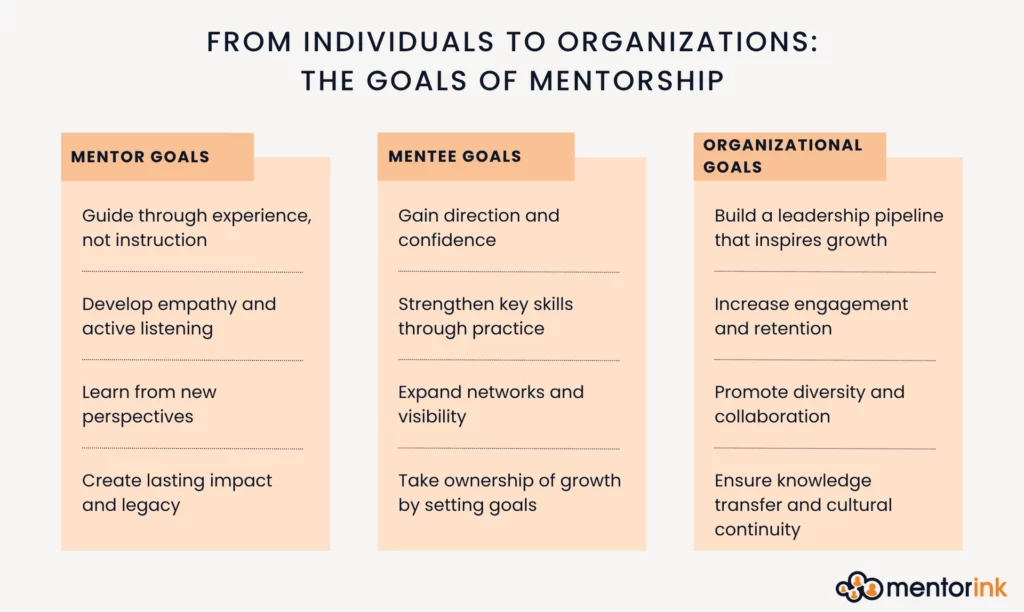
In life, having goals gives us direction. They help us focus, stay motivated, and measure how far we’ve come. The same is true for mentorship. Without goals, mentoring can feel open-ended, but with them, it becomes a purposeful journey.
Mentoring goals don’t have to be complicated. They’re simply a way for mentors and mentees to align on what matters most, whether that’s building new skills, gaining confidence, or preparing for the future. Clear goals turn mentoring into more than just a conversation, they make it a shared path toward growth.
Setting goals is where purpose turns into progress. Once you understand why they matter, it becomes easier to create meaningful, lasting mentoring relationships.
Why Set Mentoring Goals?
You can ask yourself, what are mentoring goals? Basically, mentoring goals are like a compass; they give direction and keep the journey from drifting. Without them, it’s easy for conversations to wander. With them, mentorship becomes structured, purposeful, and results driven. They help both mentor and mentee stay aligned, measure progress, and celebrate success along the way.
Setting mentorship goals also makes growth visible. When you know what you’re working toward -whether that’s building leadership skills, improving confidence, or expanding networks- it’s easier to track achievements, adjust as needed, and recognize milestones together.
Most importantly, goal setting strengthens the relationship itself. When both sides co-create and commit to shared objectives, trust grows deeper, conversations gain clarity, and the whole experience feels more meaningful. Mentoring goals transform good intentions into real outcomes.
Now that we know how goals bring structure and focus to mentorship, let’s look at what this means in practice, starting with mentors.
Setting mentoring goals is ultimately about taking ownership of your own journey. In her TEDx talk, researcher Elizabeth Trinh shares how curiosity, persistence, and purpose turned her mentorship experiences into a lifelong path of growth.
Watch: A 21st Century Guide to Mentorship (TEDxUniversityofMichigan)
Researcher Elizabeth Trinh shares how goal-driven mentorship shaped her journey, and why taking initiative is the key to growth. Her talk reminds us that mentorship isn’t about waiting for someone to guide you, but about setting intentions, saying yes to opportunities, and taking action.
Mentoring Goals for Mentors
Mentors, this part is for you. Deciding to be a mentor is just the first step, it’s how you approach it that makes the difference. Setting your own mentoring goals ensures you’re not just showing up but actually growing alongside your mentee.
Here are some inspiring goals to aim for:
- Become a better listener: Give your full attention and create space where your mentee feels truly heard.
- Lead with empathy: Practice seeing challenges through someone else’s eyes and respond with understanding.
- Gain fresh energy: Let your mentee’s curiosity and ambition reignite your own motivation.
- Shape the future: Pass on lessons and values that will live on long after the mentorship ends.
- Keep learning: Treat mentoring as a two-way street where every conversation leaves you with a new insight.
If you’d like to learn how to help mentees set and reach their goals, our How mentors can guide mentees with goal-setting article offers practical insight.

As mentors guide and inspire, mentees bring curiosity, energy, and purpose to the process. Let’s look at the goals that help them make the most of this experience.
Mentoring Goals for Mentees
If you’re a mentee reading this, know that mentoring isn’t about waiting for wisdom to land in your lap. It’s about showing up with intention and setting goals that keep you moving forward. The more clarity you bring, the more you’ll get out of the journey.
Here are some goals to focus on:
- Clarify your direction: Use mentoring to set clear goals for your career or personal growth, so you’re not just drifting.
- Build confidence: Step outside your comfort zone, take feedback seriously, and learn to trust your own voice.
- Grow your skills: Ask questions, practice what you learn, and look for opportunities to apply new knowledge right away.
- Expand your network: Leverage your mentor’s experience to connect with people, ideas, and opportunities you wouldn’t reach alone.
- Stay accountable: Show up prepared, follow through on action steps, and treat each session as an investment in your future.
- Learn to give back: Remember, most mentees eventually become mentors themselves. In fact, 89% of mentees go on to mentor others (Harvard Business Review).
Mentoring Goals for Organizations
For organizations, mentorship isn’t just about individual growth, it’s a way to create lasting value at scale. Clear goals keep mentorship aligned with broader priorities like retention, leadership, and culture. Without them, even well-meaning programs risk becoming unfocused.
Here are some common mentoring goals for organizations:
- Develop future leaders: Create a strong leadership pipeline by giving emerging talent space to practice and grow.
- Boost retention: Reduce turnover by helping people feel supported, valued, and connected to the organization.
- Transfer knowledge: Capture expertise from experienced members and ensure it’s passed on to the next generation.
- Promote diversity and inclusion: Foster connections across backgrounds, breaking down barriers and creating equity.
- Support onboarding and transitions: Help new members adapt faster and make smoother transitions into roles or responsibilities.
- Strengthen culture: Build an environment of shared learning, collaboration, and belonging.
Beyond companies, mentorship goals play an equally important role in other contexts. In NGOs, they often focus on strengthening communities, sustaining volunteer engagement, and fostering cross-cultural understanding. In universities, goals may highlight student success, academic progression, and alumni involvement, 64% of recent graduates who had a mentor during college say their mentor was a professor (Gallup).

Whether it’s personal growth or company-wide development, goals work best when they’re clear and structured. That’s where the SMART framework comes in, a simple, proven way to make mentoring goals actionable.
SMART Mentoring Goals Examples
When it comes to setting mentoring goals, clarity makes all the difference. A helpful way to shape them is through the SMART framework; Specific, Measurable, Attainable, Relevant, and Time-bound. SMART goals take broad intentions and turn them into concrete steps that both mentors and mentees can act on.
“Nothing is impossible, the word itself says ‘I’m possible’!”
Audrey Hepburn
Specific
Instead of saying “I want to get better at leadership,” define the area you want to improve. For example: “I want to strengthen my public speaking skills.” Clear goals help both sides design a strategy.
Measurable
Progress should be trackable. You might set milestones like “give two internal presentations this quarter” or “expand my professional network by attending one event each month.”
Attainable
Ambition is great, but goals need to be realistic. Consider your time, resources, and energy before committing. An attainable goal challenges you without leading to burnout.
Relevant
Make sure your goals connect to your bigger picture. If you’re aiming to grow into leadership, set goals that align with that direction, such as delegation, decision-making, or communication.
Time-bound
Without deadlines, goals tend to drift. Setting a timeline like “within 6 months” or “by the end of this mentorship cycle” creates urgency and keeps momentum.
SMART Goals for Mentors
- Specific & Measurable: “Give my mentee written feedback on their project draft within 48 hours after each submission for the next 3 months.”
- Relevant & Time-bound: “By the end of this mentorship cycle, share three personal career stories that highlight lessons in resilience and decision-making.”
SMART Goals for Mentees
- Specific & Attainable: “Schedule and lead three informational interviews with professionals introduced by my mentor within the next quarter.”
- Measurable & Time-bound: “Prepare and deliver one presentation to my department within 6 weeks, using my mentor’s coaching on structure and delivery.”
Setting SMART goals is one thing, but tracking and achieving them is another. Here’s how Mentorink turns these goals into real, measurable outcomes through its integrated tools.
Mentorink’s Goal Setting and Tracking feature
Mentorink makes mentoring goals easy to define, follow, and achieve, for everyone involved.
Here’s how it works:
- Program managers set program-specific goals that fit the purpose of each initiative, such as leadership development, onboarding, or DEI.
- These goals can be assigned to different roles, like mentors, mentees, or both.
- Once a pair is matched, the goals appear automatically on their to-do lists, creating a clear and structured journey.
- From there, mentors and mentees can personalize their goals, add milestones, and track progress step by step. Everything stays in one place, so both sides always know what’s next.

“Our mentoring goals became so much more actionable once they were visible to every pair. It keeps everyone aligned and focused.” – Mentoring Program Lead, Coca-Cola Icecek
Organizations like SHV Energy use this feature to guide pairs through leadership development goals, while CCI uses it to strengthen cross-country collaboration and shared learning.
For program managers, Mentorink’s Smart Reporting transforms this activity into insights. It highlights:
- Goal completion rates
- Progress timelines
- Engagement trends
This makes it easy to identify where extra support is needed and to showcase measurable impact without managing endless spreadsheets.
With the right structure, clear goals become more than words, they become progress in motion. Let’s wrap up with what makes mentoring goals so powerful.
Key Takeaways
Mentorship goals give direction and make growth measurable, for mentors, mentees, and organizations alike. They ensure conversations have purpose, relationships stay focused, and outcomes become visible.
By setting clear and SMART goals, you turn mentoring from a nice idea into a structured journey of learning, support, and progress. Whether your aim is to build confidence, strengthen leadership, or create a culture of growth, mentoring goals are what transform intention into impact.
At Mentorink, we help you design mentoring experiences where goals don’t just exist on paper, they’re achieved. Book a demo to see how mentoring can deliver on its promises.


